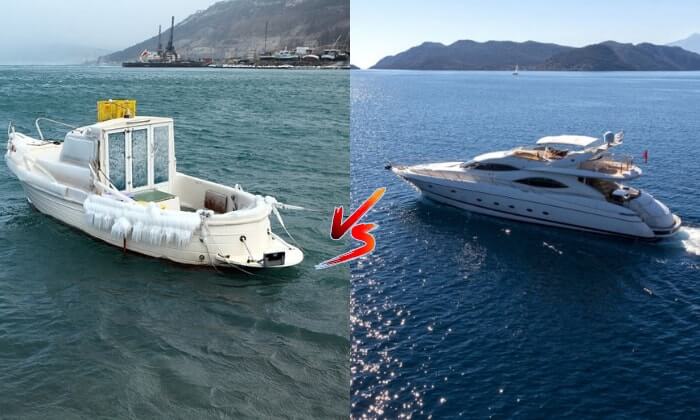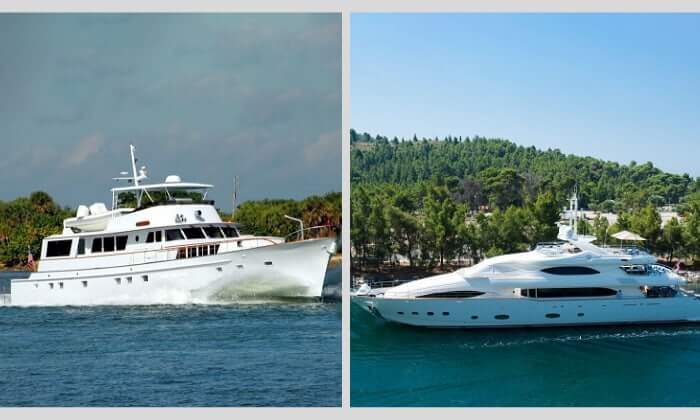So, we have boats and yachts. At first glance, they both float on water and seem like a great way to spend a sunny day. But look a little closer, and they begin to show their true colors. Think of boats as the regular bicycles of the sea world: they’re handy, straightforward, and get the job done.
Great for short rides or quick tasks. On the other hand, yachts are like those luxury cars you see in movies. More significant, flashier, and packed with all sorts of fancy stuff. They’re for those who love comfort and style on their sea adventures. While both have charm, they serve different purposes and offer unique experiences. Dive in with us as we explore the watery world of yacht vs. boat!
Overview of a Yacht
A yacht is designed primarily for leisure and recreational use, distinguishing it from working vessels like fishing boats or cargo ships. While yachts can be sailed or motor-driven, they are commonly associated with luxury, comfort, and prestige.
What Size Boat is Considered a Yacht?
The classification of yacht vs. boat is more about design and purpose than strict size parameters. However, in general terms, 30 feet (about 9 meters) and longer boats are called yachts.
- Super Yachts: Typically, vessels over 79 feet (24 meters) fall into this category.
- Mega Yachts: These are often over 164 feet (50 meters) and represent the pinnacle of luxury and size in yachting.
Commercial Purposes of Yachts
While yachts are primarily associated with personal leisure, they can also serve commercial purposes:
- Charter Yachts: Many yacht owners lease their vessels as charter yachts, providing vacationers with luxury experiences on the water. Such charters can range from day trips to weeks-long voyages.
- Yacht Races & Events: Yachts, especially sailing ones, participate in races and regattas, which can attract sponsorship and media attention.
- Training & Certification: Larger yachts requiring professional crew leads to commercial ventures offering maritime training, certification, and placement services.
Overview of a Boat
A boat is a watercraft of various sizes and types, designed to float or plane to provide passage across water. Using primarily for recreation, transportation, and specific tasks, boats serve as invaluable tools and leisure companions worldwide. Here’s a deeper look into what boats encompass:
Size and Types:
While there’s no strict demarcation on size, boats tend to be smaller than yachts, often under 30 feet (around 9 meters) in length. Boats come in various designs and serve multiple purposes:
- Fishing Boats: Designed primarily for angling activities, they often have storage, bait wells, and rod holders.
- Sailboats: Relying on sails for propulsion, they come in many varieties, from single-sailed dinghies to multi-mast schooners.
- Speedboats: Built for speed and agility, these are often used for racing, watersports, or leisure cruising.
- Rowboats: Powered by human effort using oars, they’re commonly found in calm lakes and rivers.
- Kayaks & Canoes: Narrow watercraft primarily used in rivers, lakes, and coastal areas.
Usage and Function:
Boats serve a myriad of functions:
- Recreation: From tranquil fishing trips to adrenaline-filled watersports, boats offer various recreational activities.
- Transport: Especially in archipelagic or coastal regions, boats provide essential transportation between islands or short distances.
- Occupation: Many rely on boats for their livelihood, from fishing to tour guiding.
- Rescue: Lifeboats and other specialized vessels play critical roles in rescue operations in water bodies.
- Sport: Boating competitions, from kayak races to sailboat regattas, are famous worldwide.
Sea Vessels Explored: Difference Between The Boat vs. Yacht
1. Size: The Defining Dimension
Boat: Boats are the compact vehicles of the maritime domain. They typically measure under 30 feet, providing just enough space for basic amenities and functionalities. Yacht: Contrasting starkly with boats, yachts are the giants of the seas. Starting from 30 feet, they often venture into the territory of super-yachts that stretch beyond 200 feet.
2. Propulsion Operations: The Power that Propels
Boat: How do boats move? The answers are as diverse as the boats themselves. Some rely on human power, like rowboats with oars. Others harness the wind using sails. Many modern boats, especially those used for recreation, utilize outboard motors.
Yacht: Yachts present a more complex picture when it comes to movement. Their larger structure necessitates sophisticated propulsion systems.
3. Use: Function Meets Passion
Boat: A boat’s purpose is as varied as its type. Need to fish? Boats have you covered. They also serve specific tasks, like towing or participating in water sports, ensuring a boat for almost every water-bound need.
Yacht: Yachts are less about function and more about experience. Imagine cruising through azure waters, anchoring beside secluded beaches, or hosting lavish parties amidst the ocean’s vastness.
4. Luxury and Comfort: The Glamour Quotient
Boat: Boats are built for a purpose. Their designs are straightforward, keeping in mind the core function. While some modern boats incorporate creature comforts like cushioned seating or basic entertainment systems, they’re not about luxury.
Yacht: Luxury is the essence of a yacht. It’s not just a vessel; it’s a floating piece of art equipped with modern luxuries. Think of gourmet kitchens, state-of-the-art entertainment hubs, jacuzzis with ocean views, and staterooms rivaling five-star hotel suites. Larger yachts may even feature helipads, cinemas, and gyms, making them floating mansions.
6. Price: The Investment Spectrum
The cost comparison of Yacht vs. Boat is as:
| Feature | Boat | Yacht |
| Market | Offers boats for a variety of budgets | Offering into the world of yachts means bracing for a significant investment |
| Functionality and size | Boats are often accessible to many, depending on their functionality and size | Yachts are larger and more extravagant than boats, with luxurious facilities and customizations |
| Price range | Boats can be affordable or pricey, depending on the type and features of the boat | Yachts can rival beachfront properties or penthouses as you ascend the ladder of yacht sizes and treats |
Navigating the Importance of Distinction
Why is it so essential to understand these differences? Here are some reasons:
Investment Implications: Discerning between a boat and a yacht helps potential buyers gauge their investment, from purchase and docking fees to long-term maintenance.
Operational Skills: Larger vessels like yachts demand a more profound understanding of maritime navigation. Some regions even mandate professional licenses or crew for yachts, reflecting their complexity.
Matching Maritime Ambitions: Identifying the right vessel type ensures that one’s nautical aspirations — fishing, luxury cruising, or weekend family outings — are adequately met.
Boats vs. Yachts: Insights from the Crew’s Perspective.
For Boat:
| Boat Size | Crew Size | Crew Roles |
| Small | Solo or 1-2 | – Generally focus on navigation, safety, and basic maintenance. |
| Medium | 3-6 | Given the smaller size and crew, members often juggle multiple roles, |
| Large | 7+ | – steering to maintenance to possible cooking. |
For Yacht:
| Yacht Size | Crew Size | Crew Roles |
| Small | 1-3 | – Engine maintenance, gourmet cooking, or guest services. |
| Medium | 4-8 | – Given the premium nature of yachts, |
| Large | 9+ | – The crew is often trained to offer a luxury experience |
Yachts vs. Boats: A Nautical Choice
Deciding between a yacht and a boat isn’t just picking a watercraft; it’s about embracing distinct water-bound lifestyles. This choice goes beyond mere selection—it dives deep into the unique vibes, moods, and values that each vessel radiates—both present enchanting seafaring experiences tailored to individual desires and dreams.
Yachts are synonymous with opulence, style, and the magnetic charm of the open ocean. They offer expansive spaces and state-of-the-art facilities and are perfect for hosting grand get-togethers. When a yacht anchors, it silently broadcasts its owner’s love for deluxe experiences and refined living.
On the flip side, boats resonate with liberty, straightforwardness, and closer communion with aquatic wonders. They’re for those who love the undiluted thrill of water escapades, be it a serene fishing day on a secluded lake or meandering through a winding river.
Wrap Up
Yacht vs. boat beckons with the charm of open waters, but they’re designed for different adventures and needs. Think of boats as your go-to for practical tasks or quick getaways, while yachts are all about diving into luxury, relaxation, and unforgettable sea escapades. So when you see a vessel cutting through the waves next time, you’ll know if it’s a simple boat doing its thing or a grand yacht making a statement.
FAQ’s
Q: What Is the Difference Between a Yacht and a Boat?
A: A yacht is a more extensive and more costly form of watercraft than a standard boat. It is frequently utilized for luxury reasons, such as relaxing or sailing around the Mediterranean. In contrast, a boat is a broader phrase that can apply to any watercraft.
Q: When does a boat become a yacht?
A: Yachts are often more significant than other forms of leisure boats. However, there is no hard and fast line between categories. Nonetheless, the widely accepted point at which a boat might begin to qualify as a yacht is roughly 35 feet, but they can easily be more extended.
Q: Is every boat a yacht?
A: While there is no legal criterion for a boat to become a yacht, anything longer than 40 feet might be termed a yacht, furthermore, you will most likely enter the “mega-yacht” or “superyacht” area when you increase in size.


